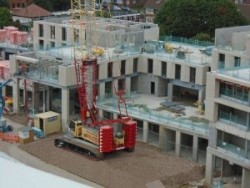FP McCann present a case study of their Modular Room System being utilised on new Birmingham University Student Accommodation.
One of the most prominent regeneration projects in Birmingham is the £48 million canal side prestigious student accommodation scheme at University Locks. The new site is part of the Birmingham City University (BCU) City Centre Campus.
The project carried out for Alumno Developments by main contractors John Sisk & Son was completed in autumn 2016. Structural engineers for the project were BWB Consulting and Architects, Glen Howells Associates.
The scheme to construct 659 student rooms (21,405m² of accommodation) in the form of cluster flats, with a main southern tower standing at 19 storeys high commenced installation mid 2015.
FP McCann commenced deliveries of the precast concrete modular room system to John Sisk early last year. Based on a process where walls, floor and ceiling slabs are linked together to form a unique crosswall construction, the precast panels were factory formed to suit design requirements.
In total, some 3,500 individual precast units were installed to form the structural frame and encompass the cladding envelope. The five panels framing each pair of bedrooms consist of walls 180mm thick, and floor slabs 175mm thick. Window and door openings have been accommodated and each bedroom has four conduits cast into the walls for electrics and communications networks.
External facade panels are of sandwich panel construction, either 525mm or 725mm thick. The inner leaf is 195mm with an external thickness of 80mm. The insulation between the concrete faces comprised either 250mm / 450mm. The outer 80mm skin of the Portland coloured concrete facade panels was cast with white cement and a selected decorative aggregate, followed by a light acid etch to complete the surface finish.
All horizontal and vertical sections were designed for ease of build, and linked together with hidden tie rods. Joints were finished with a high-strength non-shrink grout, fully conforming with British Standards. Walls were either battery cast or power-floated, which allowed for a simple gypsum wash prior to final decoration. The floors were pan float finish to the room side and steel mould finish to the ceiling. Individual bathroom pods were installed as part of the build.
The modular room system offers excellent acoustic and thermal mass properties associated with precast concrete. The University Locks building has achieved a BREEAM ‘Very Good’ rating. Commenting on the use of the modular precast concrete system, Architects Glen Howells said, “The construction method of the building offered significant savings compared to traditional build methods. The sandwich panel system removed the need for external scaffolding, thereby minimising the potential health and safety risk factor associated with people working at height, and reducing the need for follow on trades.”
Original link - PBC Today









